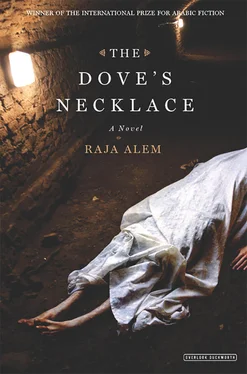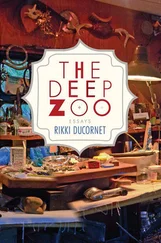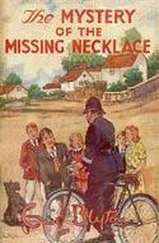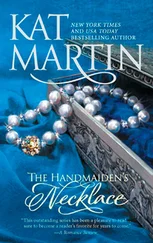God, I’m so thirsty! And for some reason your dad chose not to take a nap today even though it’s sweltering.
I’m desperate to see that black rag at your window telling me: My father’s gone out, for … ever.
On days like this, allow me talk to myself rather than to you.
Who would hire a guy who can only think about the first Abbasid dynasty, or at a push stretch to Islamic Spain in time to fall alongside Granada in the space of a single night and hand over the keys? We always come back to the key, the epitome of my nightmares. I’m searching for the keyless lock to everything that’s shut off from you and me.
Detective Nasser reached for another scrap of paper impatiently, his mouth feeling dry as he read stealthily, like an intruder creeping into a house that was off-limits, slipping into bedrooms, finding their inhabitants stark naked, framing them for crimes, seeing right into their minds without the slightest difficulty. A “window” for the city of Mecca, the Mother of Cities, found its way into his hands:
Roofs
Our ancestors were obsessed with roofs. Meccan men were fulfilled — they were ready for death — once they’d made certain that they’d built a shelter for their heirs. Some Meccans endowed their property, entrusting their houses and their land to God — thereby returning it to Him who created it — while also giving themselves and their progeny the right to build on it, live in it, or rent it out, though they could never sell or leverage it. Their heirs were forbidden from selling or dividing up the inheritance of stones and soil within the confines of the sanctuary. The wisdom of our forefathers could be summed up thus: dust turns to liquid only for the purchase of other dust (that is to say, liquidating or selling land must lead to the purchase of substitute land that will be endowed to God).
A wise principle that is today being eroded, as can be seen in all the empty spots on the map of Meccan endowments.
Reading a Footprint
H ALIMA SLIPPED INTO THE MASS OF BODIES CIRCLING THE KAABA IN THE CENTER of the Sanctuary Mosque, and as she moved she became aware of the reflection of the full moon on the marble courtyard of the mosque, casting a silver glow over the faces around her. She was borne around the first two circumambulations by the melodic Persian wail of a young Iranian man leading four women in full white cloaks who smelled of damp and dough. From the upper galleries of the mosque she could hear the wheelchairs that were provided for old men too weak to perform the circumambulation or even walk at all. She knew Yusuf was pushing one of them — a temporary means of making a living. One full Umrah ritual only cost about two hundred riyals, if the customer was willing to bargain a little.
Halima continued her circumambulation, invoking His greatest name — O Almighty! — over and over in the hope that He might restore to her what she’d lost. Her body trembled as she noticed a thin figure that had pulled away from the crowd begin swaying beside her, but without raising her eyes from her supplicating palms, she continued her rotation, finishing on the seventh circumambulation with the words “In the name of God, God is great.” When she raised her face to the corner of the Kaaba that held the black stone, she saw the names “The Living, The Everlasting” embroidered in gold, shimmering against the black silk of the covering. Without turning to look at her companion, she grasped his hand firmly and held it against her chest as she’d done so often since he was born to rein in his crazed episodes, to give him some of her tranquility:
“Are you sleeping well?” Yusuf was used to this eternal question of hers and the red blaze of insanity in his eyes diminished some.
“I gave them your papers. Forgive me.” He didn’t reply. She felt his pace quicken suddenly, and like a bird he tugged at her hand, pulling her away from the circumambulation toward the rock on which the Prophet Abraham had stood to build the Kaaba, leaving behind two footprints that were now covered over with a crystal dome set on a marble base, all enclosed in gold-plated latticework. Around the footprints was a band of silver engraved with the Verse of the Throne, and beside them, on a cushion of green velvet, lay the key to the Kaaba. Halima avoided the look of burning coals in her son’s eyes and stared instead at the key that was at the center of so many of his writings: millions of people have examined these footprints and this key, and they’ll go on doing so until the end of time. What’s the hidden message here? She wanted desperately to follow the key and the footprints, if only for a step or two, through the door to the impossible world that had possessed her son and all the other sons who were lost like him. “My whole life revolves around a key and all these doors that either open or shut in our faces.”
Halima felt even guiltier when she saw how pale and scrawny Yusuf was, and she hastily pulled her hand out of his. “They’re looking for someone to pin this body on,” she said. She hesitated before going on to tell him: “Sheikh Muzahim might ask me to vacate the room on the roof.” She could sense the anger in Yusuf’s footsteps, and it flustered her. “Some disagreement over the legality of his ownership … Sheikh Muzahim says they have doubts about his deed for the house. You know that house used to belong to my father, who sold it to Muzahim, but now someone else is claiming they have an even older deed.”
“Muzahim never stops complaining. He’s trying to make everyone in the neighborhood think he’s fighting for some noble goal, but the truth is he wouldn’t let anyone cheat him out of a grain of sand. And when it comes to you, he’ll just go on playing the gallant knight forever …”
“That’s true, but it’s still up in the air. If worst comes to worst I can always go live at the home with Yousriya, Khalil the pilot’s sister, and the other women.”
“You? Live there?! Mom, you earn your living from making music and livening up weddings with your tea ceremonies. You’d die in that depressing place! Maybe Mecca’s getting back at us because we’re both such hypocrites!” Halima could feel the crackle of electricity in Yusuf’s voice, and it reminded her of that morning a few months earlier when Imam Dawoud was leading the prayers in the mosque in the Lane of Many Heads and he recited Verse 32 from the Banquet Chapter: “If someone kills one person, other than to avenge a murder or prevent wickedness on earth, it is as if he has killed all mankind; and if someone saves a life, it is as if he has saved all mankind.” Something went off in Yusuf’s head when he heard that verse. One moment he was on the roof and the next, he’d leapt down to the alley in a single bound, his eyes shooting sparks like a wounded animal, and he broke through the door of the mosque with a thunderous clatter. The worshippers tried to ignore him, but he pushed them aside as he elbowed his way through their ranks in the direction of the air-conditioning unit. He snapped it off, and then he turned out the lights as well, ricocheting from one switch to the other like a bullet, and then he went up and snatched the microphone from under Imam Dawoud’s nose.
“You, people of the alley, whom I cherish and whose lost causes I’ve defended tirelessly in my column …” His eyes bored into the alarmed faces arrayed before him. “You’ve stolen my life. You’ve suffocated every youthful spirit in the neighborhood. You’re nothing but a bunch of hypocrites and liars who’ve banded together to fight life itself. You poison the minds of young people in the Lane of Many Heads. You’ve turned this place into a den of spies who pry into our most profound desires, our most intimate dreams. You’ve managed to turn the most private moments in our lives into a living hell. And you still have the nerve to stand in a house of God, blasting your prayers over the loudspeaker five times a day! You pray to ingratiate your way into heaven after you’ve gone and made our lives unbearable.” Yusuf avoided the sympathetic look in the cook Abd al-Hamid al-Ashi’s eyes and directed his rage at Sheikh Muzahim. “You. You build prisons with your left hand and mosques with your right. You’re always preaching about faith, but what faith? The faith of burying your daughter alive every day? The Lord knows you’ll be held to account on Judgment Day for all these prayers and prostrations. And you—” Yusuf turned to Yabis the sewage cleaner. “You dream of making it to heaven by cleaning up our shit! You’re killing yourself day in and day out, but you think that our excrement’s going to win you God’s favor. What kind of role model are you for us and your own children? What if we all followed your lead and became cockroaches living off the neighborhood’s waste? Of course, I’m a hypocrite, too. None of us knows what it means to live next door to God’s holiest sanctuary, what it requires of us. Are we supposed to celebrate life? Or to fight against it?”
Читать дальше












